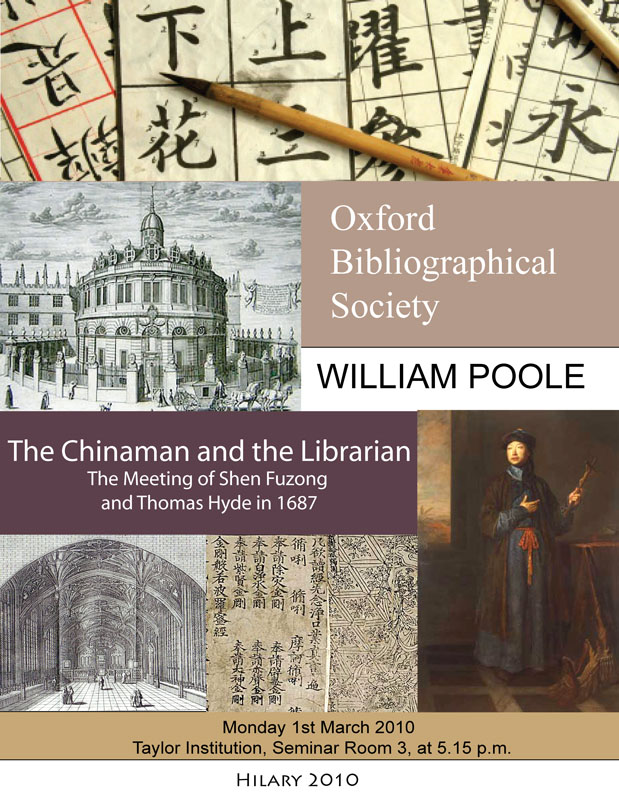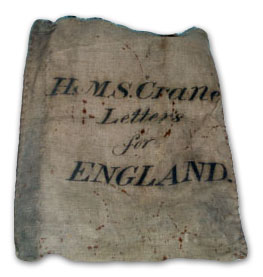You are viewing the Cultures of Knowledge Blog archive for the ‘Events’ Category:

Exploring Early Chinese Correspondences
Dr William Poole, a member of the English Faculty and New College and one of our John Aubrey researchers, is scheduled to give two lectures relevant to the Project in Oxford in the coming fortnight. The first, which will take place at the Taylor Institution under the auspices of the Oxford Bibliographical Society on Monday 1 March at 5.15pm, will explore the earliest surviving English-Chinese correspondence, which dates from 1687-88 (see the poster on the right). The second, which will take place at the Museum of the History of Science on Tuesday 9 March at 7pm, will explore the relationship between Oxford and the Royal Society in the seventeenth century, and forms part of the Museum’s year-long season of activities marking the 350th anniversary of the Society. For further details, see the MHS website. Update: these lectures are now online.
James Brown
February 06, 2010
Events
Tags: Geography, Spatial Theory
 An international, interdisciplinary conference on ‘From Space to Place: The Spatial Dimension in the History of Western Europe’ will take place at the German Historical Institute on 16-17 April 2010. Organised by the Centre for Research in History and Theory at Roehampton University, and featuring contributions from historians, geographers, anthropologists , archaeologists, and literary scholars, the conference will challenge the idea of place or space in history as an unreflected essentialist category linked to tradition and immutability, and will show how it was instead socially and culturally constructed, mediated, and contested. There will be broader reflections on historiography and spatial theory as well as case studies from a wide chronological span (including many from the medieval and early modern period). For programme and booking information see the conference website.
An international, interdisciplinary conference on ‘From Space to Place: The Spatial Dimension in the History of Western Europe’ will take place at the German Historical Institute on 16-17 April 2010. Organised by the Centre for Research in History and Theory at Roehampton University, and featuring contributions from historians, geographers, anthropologists , archaeologists, and literary scholars, the conference will challenge the idea of place or space in history as an unreflected essentialist category linked to tradition and immutability, and will show how it was instead socially and culturally constructed, mediated, and contested. There will be broader reflections on historiography and spatial theory as well as case studies from a wide chronological span (including many from the medieval and early modern period). For programme and booking information see the conference website.

Testing the record-editing interface.

Comparing calendars.
Yesterday provided us with a valuable opportunity to bring individual CofK researchers together with OULS technical experts for a day of intensive training and consultation on various aspects of our nascent union catalogue of seventeenth-century intellectual correspondence. Scholars working on the Aubrey, Lister, Lhwyd, Hartlib, and Comenius collections explored the latest iteration of the pilot database; tested its online interface for the editing of letter records as well as our free-standing application for the collection of epistolary data; and compared individual calendars against each other as well as Project standards. The first version of the catalogue will be launched at the Universal Reformation conference, which will take place in Oxford on 21-23 September 2010.
James Brown
December 02, 2009
Events, Project Updates
Tags: Samuel Hartlib
![Frontispiece from Andrea Buonaccorsi’s ‘Newes come latle fro[m] Pera’, published London, 1561 (Bodleian Library, Oxford). newes](../../../../wp-content/uploads/2009/12/newes.jpg) Dr Leigh Penman, the Project’s Samuel Hartlib Postdoctoral Fellow, will this week deliver a paper in the Oxford History Faculty’s Early Modern Europe Seminar entitled ‘Prester John’s Legacy: The Hartlib Circle, Andreas Haberweschel, and the Fantasy of a Christian Kingdom in the Orient in Seventeenth-Century Europe’. As Leigh describes it, ‘in 1643, word reached the London-based intelligencer Samuel Hartlib that diplomats from a heretofore unknown Christian kingdom had recently visited an obscure Bohemian physician, Andreas Haberweschel, at The Hague. Anticipating funds and weapons for Protestant Europe, Hartlib and his compatriots greeted the news, despite its dubious provenance, with delight and enthusiasm. Yet, perhaps predictably, not everything was as it seemed. In this paper, which draws extensively on the Hartlib Papers, I shall unpack some of the contemporary codes and contexts that made news of this Christian kingdom of the ‘Indies’ plausible for those that heard it. I want to use the incident as a looking glass in which we might reflect on the activities and expectations of Hartlib and his circle, as well as of European Christians more broadly. For this incident not only tells us much about the nature of contemporary Reformed eschatology, but also sheds light upon the contemporary reception and assimilation of geopolitical news, methods of constructing ideas of the Christian self through the projection of values on to the other, as well as nascent aspects of imperial ideological discourse’. The paper will take place at 2.15pm on Friday 4 December in the Rees Davies Room of the History Faculty.
Dr Leigh Penman, the Project’s Samuel Hartlib Postdoctoral Fellow, will this week deliver a paper in the Oxford History Faculty’s Early Modern Europe Seminar entitled ‘Prester John’s Legacy: The Hartlib Circle, Andreas Haberweschel, and the Fantasy of a Christian Kingdom in the Orient in Seventeenth-Century Europe’. As Leigh describes it, ‘in 1643, word reached the London-based intelligencer Samuel Hartlib that diplomats from a heretofore unknown Christian kingdom had recently visited an obscure Bohemian physician, Andreas Haberweschel, at The Hague. Anticipating funds and weapons for Protestant Europe, Hartlib and his compatriots greeted the news, despite its dubious provenance, with delight and enthusiasm. Yet, perhaps predictably, not everything was as it seemed. In this paper, which draws extensively on the Hartlib Papers, I shall unpack some of the contemporary codes and contexts that made news of this Christian kingdom of the ‘Indies’ plausible for those that heard it. I want to use the incident as a looking glass in which we might reflect on the activities and expectations of Hartlib and his circle, as well as of European Christians more broadly. For this incident not only tells us much about the nature of contemporary Reformed eschatology, but also sheds light upon the contemporary reception and assimilation of geopolitical news, methods of constructing ideas of the Christian self through the projection of values on to the other, as well as nascent aspects of imperial ideological discourse’. The paper will take place at 2.15pm on Friday 4 December in the Rees Davies Room of the History Faculty.
 Papers are sought for an interdisciplinary graduate conference on ‘Intellectual Exchange and Networks in Europe, 1500-1660: Approaches from the Humanities and Social Sciences’, due to take place at the University of Chicago on 7-8 May 2010. Featuring keynote contributions from Denis Crouzet and Peter N. Miller, the conference will explore how ideas moved through Europe between 1500 and 1660, with a particular emphasis on social networks, trade routes, epistolary webs, and multiple forms of literary transmission. The conference will also consider the movement of ideas in the present. The deadline for the receipt of 250-word abstracts is 30 November 2009; for further details and submission instructions, see H-Net.
Papers are sought for an interdisciplinary graduate conference on ‘Intellectual Exchange and Networks in Europe, 1500-1660: Approaches from the Humanities and Social Sciences’, due to take place at the University of Chicago on 7-8 May 2010. Featuring keynote contributions from Denis Crouzet and Peter N. Miller, the conference will explore how ideas moved through Europe between 1500 and 1660, with a particular emphasis on social networks, trade routes, epistolary webs, and multiple forms of literary transmission. The conference will also consider the movement of ideas in the present. The deadline for the receipt of 250-word abstracts is 30 November 2009; for further details and submission instructions, see H-Net.
Contributions are sought for a workshop on ‘Intellectual Networks and Exchanges’, due to take place at Wolfson College at the University of Cambridge on 1-2 July 2010. Building on the methodological redefinition of ‘exchanges’ and of ‘networks’ which has occurred in the past three decades, the workshop will investigate cultural and intellectual networks and exchanges of ideas from the late medieval to the modern period. It will pay particular attention to the role of sources, historical factors, geography, images, and ideologies in creating, fostering, and preserving communicative practices, especially within colonial settings. For further information, please see the workshop webpage or contact the organizer, Dr Isabel DiVanna.


 An international, interdisciplinary conference on ‘From Space to Place: The Spatial Dimension in the History of Western Europe’ will take place at the
An international, interdisciplinary conference on ‘From Space to Place: The Spatial Dimension in the History of Western Europe’ will take place at the 

![Frontispiece from Andrea Buonaccorsi’s ‘Newes come latle fro[m] Pera’, published London, 1561 (Bodleian Library, Oxford). newes](../../../../wp-content/uploads/2009/12/newes.jpg)
 Papers are sought for an interdisciplinary graduate conference on ‘Intellectual Exchange and Networks in Europe, 1500-1660: Approaches from the Humanities and Social Sciences’, due to take place at the
Papers are sought for an interdisciplinary graduate conference on ‘Intellectual Exchange and Networks in Europe, 1500-1660: Approaches from the Humanities and Social Sciences’, due to take place at the 
 Join
Join 